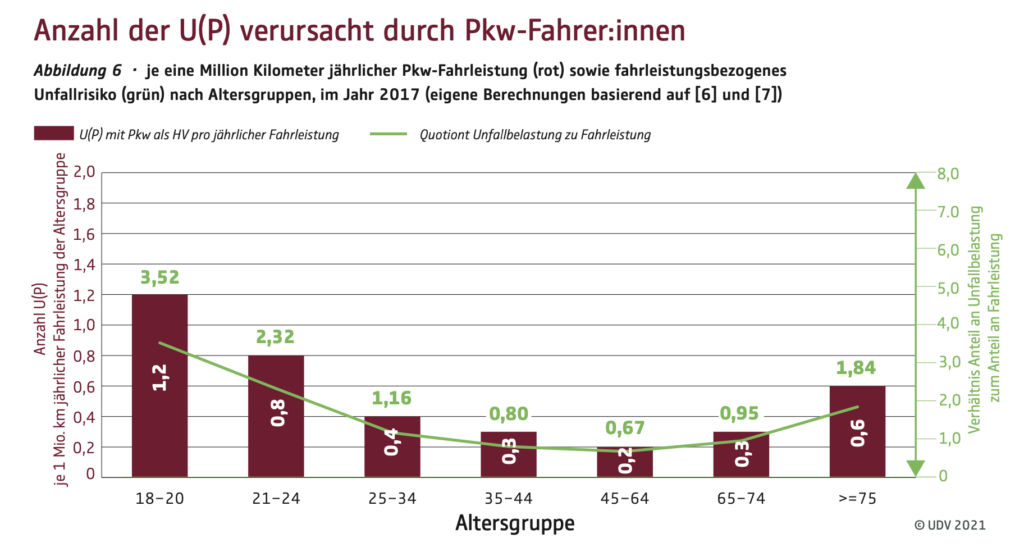In an interview with the German news agency “RedaktionsNetzwerk Deutschland” (RND), Stefan Gelbhaar, transport policy spokesman for the German political party “The Greens”, said: “After novice drivers, older people are the most likely to cause accidents per kilometre driven”. According to our research, this statement is mostly false.
In the RND article “Driving in old age: Greens call for driving tests for seniors” from 12th March 2024, the politician Stefan Gelbhaar speaks out for regular driving tests because “with age, vision, hearing, and reaction time slowly begin to deteriorate”. The politician’s other argument in favour of regular driving tests seemed to be the fact that “after novice drivers, older people are the most likely to cause accidents per kilometre driven”. However, this claim needs a factcheck to ensure its accuracy. Because the outcome is mostly false we don’t link to the original source, we don’t want to spread misinformation.

Understanding accident risk of different age groups
When asked, Gelbhaar’s team stated that the statement referred to another article published by RND. In that article, Kirstin Zeidler, the head of the German Insurers Accident Research (UDV), uses distance travelled as a measure of accident frequency, as older people are less involved in road traffic than younger people because they no longer have to commute to work. In the statistics, people aged 75 and over are included as a separate age group, as mental and physical abilities at this age can be significantly worse than those of younger seniors.
The mentioned statistic from Zeidler compares the accident risk of different age groups in relation to the distance travelled. The distance travelled was taken from the “Mobility in Germany (MiD) — 2017” household survey by the Federal Ministry of Transport and Digital infrastructure, which is the most recent data available. The accident data for the different age groups comes from the German Federal Statistical Office, Destatis, and includes all accidents resulting in personal injury recorded by the police in 2017 on German roads, in which car drivers were the prime suspects involved.
Analysis of accident risk by age group
To calculate the accident risk per distance travelled for each age group, the UDV study used its own calculation: For each age group, a quotient was calculated. This is calculated by dividing the age group’s share of the total number of accidents involving personal injury by the age group’s share of distance travelled.

If this quotient is 1, the accident risk of an age group is equal to its distance travelled. Values above 1 indicate a high risk of accident per distance travelled, while values below 1 indicate a low risk.
The statistics shows that although extremely high accident rates are recorded in the age groups of 18 to 24-year-olds, these rates then decrease sharply due to increasing driving experience and decreasing risk-taking. It remains at a very low level until about the age of 65. However, from the age of 75 an increase is observed.
Clarifying age groups and risk factors in driving statistics
Gelbhaar’s statement lacks clarity on age groups. “Novice drivers” could include people of any age in their probationary period. However, there is no research on this. In common parlance, novices are considered to be between 18 and 20 years old. Regarding the elderly, usually are defined as people aged 65 and over, but Gelbhaar’s reference to increased crashes starts at 75. To show the over 75s as the second most frequent cause of accidents, the group of 18-24 year olds must be considered together. If we consider the ‘novice drivers’ in Gelbhaar’s statement as the group of 18 to 24-year-olds and the ‘older drivers’ as people aged 75 and over, the UDV statistics would confirm Gelbhaar’s statement.
Other factors, such as gender, the difference between frequent and infrequent drivers, and certain illnesses, also influence the risk of accidents, according to Ralf Buchstaller, traffic psychologist at TÜV Nord. His assessment of Gelbhaar’s statement was: “Due to the many unclear points in this general statement, it must be viewed very critically. There are a lot of question marks”.
What else is important?
Hardy Holte, traffic psychologist at the Federal Highway Research Institute, emphasizes the importance of attention control when driving. He explains that fitness to drive also includes the ability to direct attention safely, with various aspects such as selective attention playing a role. These skills are essential for recognizing dangerous situations on the road at an early stage and reacting appropriately.
What else is important: the ability to concentrate or make decisions quickly. And yes, there’s a whole range of other things.’ He also mentions the ability to suppress irrelevant environmental factors, which is crucial for road safety. These skills can change over the lifespan, not only due to age, but also due to illnesses such as dementia or Parkinson’s disease.
“The point is, the change doesn’t necessarily have to be disadvantageous,” says Holte. He explains that older people are able to compensate for any deficits that develop. This is often done by adjusting their driving behaviour, such as avoiding certain times of day or traffic situations. As a result, older drivers generally stay safe on the roads.
EU Parliament’s decision on health checks for old drivers
The European Parliament has decided to leave it up to EU member states to decide whether they want to introduce obligatory health checks for older drivers. This was done as part of a revision of the Highway Code based on a proposal by the European Commission in March 2023, which provides for the renewal of driving licenses every five years from the age of 70. Some EU countries have already introduced such medical tests. On 28 February, the EU Parliament decided that national governments themselves can decide on medical tests for driving license holders.
Do driving tests help?
Studies by the German Insurers’ Accident Research Institute have investigated whether international systems for testing the driving skills of older car drivers help to prevent accidents. However, it has been shown that these systems have no influence on the occurrence of accidents. The UDV studies show: There is no reason to force older car drivers to take a test.
The video summarises the factcheck
Conclusion
In summary, it can be said that seniors drive very cautiously and comply with the rules, but have trouble in complex traffic situations. A particular problem is the high physical fragility of the seniors, which quickly leads to injuries or even death as a result of an accident. The claim that older people have the highest accident rate per kilometer after novice drivers was made by transport policy spokesman for the German political party “The Greens” Stefan Gelbhaar in an interview with the RND. A thorough investigation refuted this statement. It was found that these health checks for older drivers have a small to negative impact on road safety rather than a positive one.
To have a look on the responsibility of the media according to the discussion about seniors’ driving ability read our Blogpost Looking behind the headlines – media ethics and seniors’ driving ability
RESEARCH | ARTICLE © Zoe Goslar and Amy Okrongli, Jade University of Applied Sciences Wilhelmshaven, Germany
Leave your comments, thoughts and suggestions in the box below. Take note: your response is moderated.





